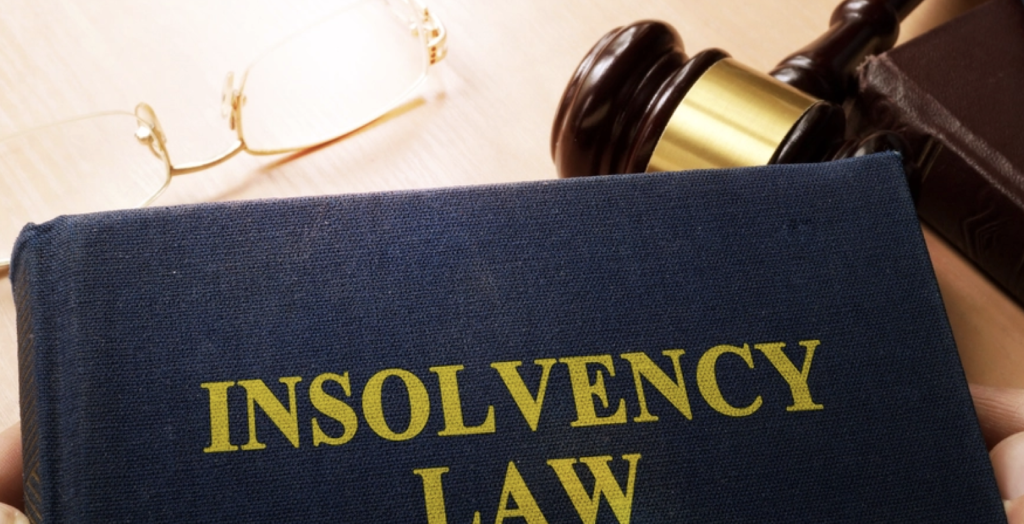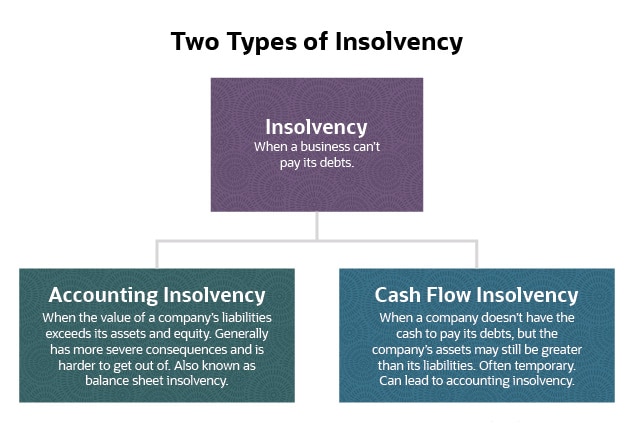How Insolvency Practitioner can Save You Time, Stress, and Money.
How Insolvency Practitioner can Save You Time, Stress, and Money.
Blog Article
The smart Trick of Insolvency Practitioner That Nobody is Discussing
Table of ContentsExamine This Report about Insolvency PractitionerUnknown Facts About Insolvency PractitionerEverything about Insolvency PractitionerThe Insolvency Practitioner StatementsWhat Does Insolvency Practitioner Do?Insolvency Practitioner for DummiesA Biased View of Insolvency Practitioner
Insolvency is when liabilities are above the value of the firm, or when a borrower can not pay the financial debts they owe. A company can come to be financially troubled as a result of a number of situations that bring about bad money circulation. When confronted with insolvency, a company or person can call financial institutions straight and restructure financial debts to pay them off.Service owners might call creditors straight and restructure financial obligations into more manageable installations. Creditors are typically responsive to this method since they want to be settled and avoid losses, also if the payment is on a delayed schedule.
What Does Insolvency Practitioner Do?
The proprietor creates a proposal describing how the financial obligation may be reorganized using price reductions or various other prepare for support. The proposal shows financial institutions how the business may generate enough money circulation for lucrative procedures while paying its debts. Typically, a forgiven financial obligation might be considered earnings by the Internal Revenue Service (INTERNAL REVENUE SERVICE).

The Main Principles Of Insolvency Practitioner
When procedures stop, so does the firm's income (Insolvency Practitioner). Some business end up being insolvent since their products or services don't progress to fit consumers' changing requirements.
Costs exceed profits and expenses remain unpaid. Cash-flow insolvency happens when a firm has the properties to cover their debts yet they are in the wrong kind, such as real estate rather of liquid funds. Balance-sheet insolvency, on the other hand, suggests a lack of assets in any type to cover financial debts.
The internal revenue service states that an individual is insolvent when the total obligations surpass total possessions. A personal bankruptcy, on the various other hand, is a real court order that shows exactly how a financially troubled individual or service will certainly settle their financial institutions, or just how they will certainly offer their properties in order to make the repayments.
Insolvency Practitioner for Beginners

Financial obligation consolidation is when you combine multiple lendings right into one new funding, usually to attain far better terms. Bankruptcy is not the very same as insolvency, although a firm that has become financially troubled might submit for bankruptcy. Bankruptcy is the state of not having the ability to pay your obligations while insolvency is a legal process to discharge your debts.
Recognizing the factors that can cause insolvency, such as overspending, can help you protect against insolvency and its repercussions.
5 Easy Facts About Insolvency Practitioner Shown
It is popular that directors and officers of firms (and managers of limited obligation companies) owe fiduciary responsibilities to their organizations and their shareholders (or participants). These fiduciary obligations are specified by state statutes and, though there are variants from state to state, they generally include a task of commitment and a task of care.
The obligation of treatment calls for supervisors and officers to work out diligence, to make informed choices, and to act in good belief to make sure that their activities are in click here for more info the best interest of the company. Though past the extent of this discussion, some states permit these tasks to be limited either by so noting in the business files or adhering to various other needs.
The Best Guide To Insolvency Practitioner
Many states specify bankruptcy in two methods( 1) when a company's responsibilities come to be above the sum of its assets or (2) when the company ends up being not able to pay its financial obligations as they come to be dueand accept both interpretations (Insolvency Practitioner). The shift in duties happens because when a business is financially troubled, there is no worth in the business beyond that owed to the company's lenders so that the equity owners no more have a financial risk in the business
Beware about giving shareholders special therapy at the expense of financial institutions (e.g., accrediting and funding a returns or a supply redemption). Be mindful concerning favoritism between courses of investors. Clear up efforts to find out all the facts prior to taking a details training course of activity; supervisors should genuinely believe that any decisions made are in the very best passions of the corporation in its totality (i.e., decisions will be assessed in knowledge because of the effect of such activities on the company).
In any insolvency or insolvency case, payments made to certain creditors at the expense of various other financial institutions can be clawed back, particularly if there is some link between the company and the lender. Consider suggesting at a yearly investor conference (or any type of other conference of investors) a resolution verifying that all prior organization decisions and activities taken by the supervisors and police officers of the corporation were taken in excellent belief after a workout of affordable treatment.
The Basic Principles Of Insolvency Practitioner
Completely reveal any type of individual or business relationships with parties beyond of check my reference purchases entailing the firm to stay clear of the look of a problem of passion. In reviewing potential fund elevating transactions or a sale of possessions of the troubled corporation, understand that these purchases may be looked at later on due to any type of subsequent expansion of supervisors' fiduciary duties to include informative post financial institutions.
Report this page